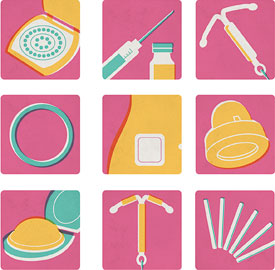Preventing pregnancy, while ensuring the fire in your bedroom doesn’t fizzle out is a challenge faced by couples across the globe. Sometimes even after undertaking utmost precautions, nature does tend to spring up an unpleasant surprise.
The reason for this could partly be due to inaccurate knowledge about causes of contraception, signs of contraception, foods that cause contraception and how to treat contraception.
In this article, we decode 7 myths about contraception that every couple must be aware about.
-
Myth 1: The Pill is going to make me fat!
Truth: Yes, it could….but this entirely depends upon your prescription. The research carried out by the American Journal of Obstetrics and Gynecology in 2009 concluded that women using the Depo-Provera shot had gained an average of 11 pounds. Additionally, their body fat had increased by 3.4 percent over three years.
However, research conducted in 2011 at the Cochran Database System Review found no relation between weight gain and birth control.
So, if weight gain is one of the symptoms of contraception that you most fear, then communicate the same to your doctor immediately.
-
Myth 2: I’m breastfeeding, so I don’t need to be on birth control
Truth: This misconception can and has led to many unplanned pregnancies. It’s important to understand that while breastfeeding (without supplementing with formula); your fertility does plummet. However, it is not foolproof at all. Also, the chances of conceiving increases even more if the mother is breastfeeding while supplementing it with formula sometimes.
-
Myth 3: The Pill must be taken at the same time, every single day.
Truth: Not necessary, unless you’re on the mini-pill, which needs to be taken at the same time every day.
However, the regular birth control pill is what is preferred by most women. According to Vanessa Cullins, M.D., Vice President for External Medical Affairs at Planned Parenthood, taking the regular birth control pill at the same time each day does not lead to improved effectiveness.
-
Myth 4: Continued usage of the Pill will make it difficult to conceive later
Truth: Don’t be surprised if you get pregnant soon after stopping birth control pills! The fact is, fertility does not get affected due to long term usage of hormonal contraceptives confirms Mary Jane Minkin, M.D., clinical professor of obstetrics and gynecology at Yale University School of Medicine. This stands true even in the case of the Depo-Provera shot, which may take up to 6-9 months for all of the hormones in the shot to exit your body before your fertility is restored.
-
Myth 5: IUD is only for women who’ve already had children.
Truth: IUD is an extremely effective pregnancy prevention option for both non-moms and women with children. This misconception has arisen due to availability of different types of IUDs. For instance, Mirena and ParaGuard are recommended for women with children. But a newer IUD called Skyla is ideal for non-moms.
-
Myth 6: A condom takes the fun out!
Truth: Condoms don’t really kill the moment; it may all just be a mind block. The different varieties of condoms available today can actually improve your sex life. Browse through the pleasure-enhancing options and make sure to own some. It’s simply the most effective hormone-free birth control option.
-
Myth 7: Birth control should be stopped to give your body a break.
Truth: Birth control must be stopped only if you wish to conceive. Besides that, there should be no other reason that should lead to discontinuation of your chosen method of birth control. However, Depo-Provera is an exception to this as the FDA recommends that women take it continuously only for two years.
Also Read: Understanding Male Breast Cancer- Symptoms and Diagnosis
We hope the information provided above takes away the confusion and helps you lead a healthy life free from misconceptions. We would love to hear from you, so do provide us with your feedback.




